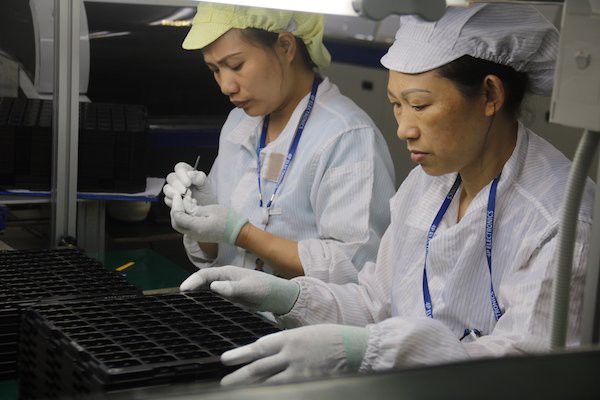
Two employees are at work at an FDI firm. The Ministry of Planning and Investment has proposed that preferential policies should be applied only to stages of hi-tech projects executed in Vietnam. (Photo: Thuy Dung)
The ministry is preparing a plan to attract foreign direct investment (FDI) in the coming period and will submit it to the Politburo this month.
Vu Dai Thang, deputy minister of Planning and Investment, said that Vietnam is finalizing socioeconomic development strategies for the 2011-2020 period and is building strategies for the next decade.
Over the last 30 years, the country attracted some 28,000 FDI projects, with total registered capital of US$300 billion. Of this amount, US$200 billion has been disbursed.
Thus, FDI has played an indispensable role in promoting further economic development. However, the country should change the ways it attracts and uses FDI to ensure its effectiveness.
Foreign investors have mainly poured their capital into the outsourcing stage of Vietnamese firms to utilize the low-cost workforce. They have also considered Vietnam as a country that can share the risks of their China+1 and Thailand+1 strategies.
In the coming days, Vietnam should allow hi-tech projects that are environmentally friendly and use only high-skilled labor.
Thang said that all hi-tech projects are entitled to incentives, while some investors complete only 30% of their production lines in Vietnam.
The investment environment in Vietnam has been gradually improved and recognized as one of the four most competitive in the ASEAN region, the deputy minister noted.
Nguyen Minh Cuong, an economic expert at the Asian Development Bank (ADB), said investors now prefer markets with high labor productivity and a transparent business environment rather than those with low labor and production costs.
At a regular Cabinet meeting early this month, Minister and Chairman of the Government Office Mai Tien Dung said that FDI attraction was the highlight of the country’s economic performance last quarter.
Fresh FDI approvals in the first three months of the year reached over US$5.1 billion, surging 30% year-on-year.
According to a survey on the performance of Japanese businesses in Vietnam conducted last month, up to 70% of Japanese firms wanted to expand their business in Vietnam, while only 48.7% of Japanese companies operating in China had expansion plans in China.
Moreover, 6.7% of Japanese companies in China planned to narrow or suspend their operations, while just a few Japanese enterprises had plans to withdraw from Vietnam.
The attractiveness of the Chinese market to Japanese investors has declined, given trade tensions with the United States, Deputy Minister Thang said, adding that investors would definitely seek other emerging markets.
Besides China, foreign investors are moving their operations from Cambodia to Vietnam. In February, the European Commission began an 18-month process to consider waiving the tax exemption for imports from Cambodia.
Vietnam may benefit from the waiver, stated ADB Country Director for Vietnam Eric Sidgwick.
A report on new-generation FDI attraction by the International Finance Corporation, a member of the World Bank Group, showed that Vietnam is growing increasingly attractive to international investors, especially those wanting to produce goods for export.
In addition, the free trade agreements signed by Vietnam have helped it access large markets, such as Japan, South Korea and India. The European Union-Vietnam free trade pact, which is expected to be signed next month, will help Vietnam attain gross domestic product growth of 7%-8% this year.


















